Editor’s Note
This is an abridged translation of the talk that prof. Jia Xijin, from Tsinghua University’s School of Public Policy and Management, gave at CDB’s forum for overseas NGOs, held in Beijing on the 6th of November. We have also included translations of some of the slides that Prof. Jia used during her talk, and the final Q&A session. A few parts have been omitted for clarity.
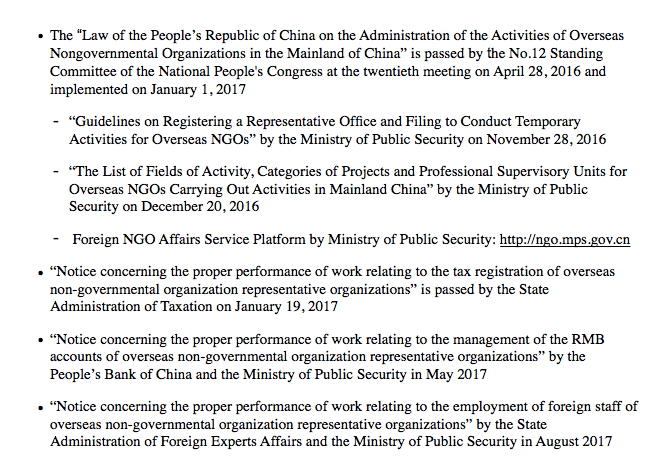
It is clear to see that several important legal documents were published within half a year of the law being released. This year has not seen as much reform, but what there has been has mainly been regulations in the areas of taxes and personal affairs.
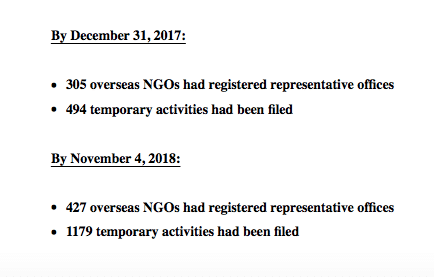
Comparatively speaking, there has been a much larger increase in filings for temporary activities, while there has been a relative slowdown in the growth of full registrations.
 The number of registrations from January 2017 to October 2018
The number of registrations from January 2017 to October 2018
It is evident both that the peak in the first year was anomalously high, and that there remains significant volatility. In the latter half of that year and the first ten months of this year, the curve has slowed down, with a particularly low point in June. It is clear that there are particular reasons behind several notable points in this period.
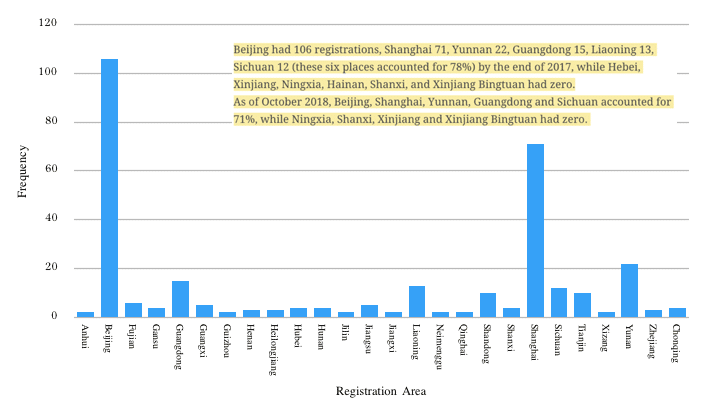
Across 2017, registrations from just six places comprised 78% of the national total. In 2018, Sichuan just edged past Liaoning – however, the same basic structure of the previous year is still very much present, and the registrations are still quite concentrated.
In 2017 there were six places which had not seen any registrations, and currently there are still four places with no registrations. Other than that there has not been much change. The two places with the highest number of registrations are still Beijing and Shanghai for historical and socio-economic regional reasons, followed by Yunnan, Guangdong, Liaoning and Sichuan.
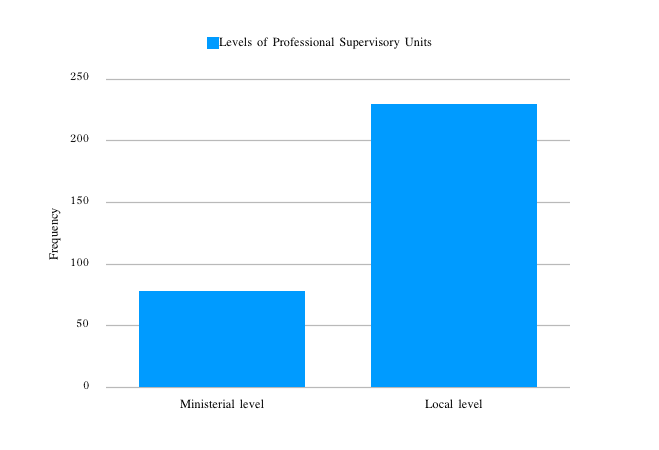
The data from 2017 until present has also remained consistent in the area of registration of PSUs. Of these, one fourth are at the ministerial level and three fourths at the provincial level.
The fields of activity are very interesting; the data structures of 2017 and 2018 have seen almost no change. The proportion of national, cross-provincial and provincial registrations across the whole country is essentially 1/3 for each.
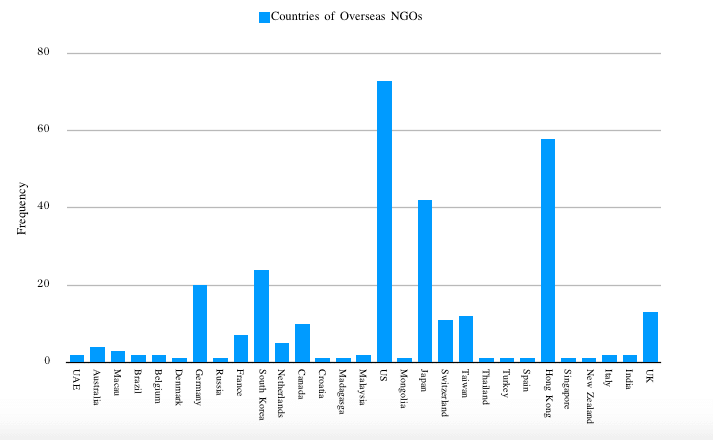
The place with the greatest distribution of NGOs in China is the US, followed by Hong Kong, Japan, South Korea and Germany, which collectively account for 60-70%. Those from Hong Kong, Macao and Taiwan account for 25%.
Summary
The following are the particularities of the situation from the end of 2017 until today.
The first thing is that the degree of dynamism of different places in terms of registrations and of filings of temporary activities is not exactly the same. Beijing, Shanghai, Yunnan, Guangdong, Sichuan and Liaoning are the most dynamic places in terms of registering representative offices, while Beijing, Guangdong, Guizhou, Yunnan and Sichuan have seen the most temporary activity filings.
Some places however are active in both permanent registration and temporary activities filing, for instance Beijing and Yunnan, which lead in both areas. Then there are some places where it is different, such as Shanghai, which clearly has a high number of permanent registrations but a low number of filings. Then there are provinces like Guangdong, Sichuan and Guizhou that have seen relatively few registrations, but are very active in terms of filing for temporary activities. It can clearly be seen that the situation varies a lot according to the place.
Another thing is that the attitude of local governments is not necessarily reflected by the statistics. Some regions may not have that many organisations coming to apply, but it can still be seen from the filings that the government has an open and positive attitude. For example in Yunnan, the structures we have just discussed have not changed much, but the number of filings rose very fast in 2018.
Progress and points of difficulty
The trend in registrations
This year’s peak period did not match the highest few months of last year, so it can be said that there has been slow down in the peak period; the gap between last year’s peak and the lower points was also very large, whereas this year was generally more uniform.
The trend in filings
This year filings for temporary activities have grown much faster than last year. This tells us that in the long term, for organizations with difficulties in registering representative offices, filing may become easier.
Of course, the legality provided by filing and registering are not the same. With registration, legality is comprehensive. However, with filing legality is based on each individual project or event, but this sort of legality could perhaps turn into a routine channel. The tendency towards filing is likely to increase in the next couple of years. If so, it could turn into a normalized channel towards legality.
What are the challenges for development?
Filing for temporary activities has become more and more normal compared to registration, and the pathways for filing temporary activities have similarly been normalized in some places. For example, if some organizations have already used a certain pathway for registration, this channel will already be established for the next event or the next organization. Many places have already made attempts to improve or simplify the process. If it is an organization’s first time filing, they might need to provide all the original documents, but be able to request photocopies at the time of filing. The registration platform of the Ministry of Public Security is a nationally standardized platform, and technology allows for the original information of each organization to remain on the platform.
The next time an organization files for an activity, or if it files in a different place, the original documents will be available on the platform so they will not need to be provided every time. Therefore, once an organization has filed once, the previous information can be shared in each subsequent filing. This should be the process that is being promoted everywhere now. There are still many limitations on time requirements, especially in some places. For example, the period for most filings in Guangdong is one year. The process is flexible and with a standardized structure for the filing process, it is possible everywhere to obtain legality within a fixed annual period. Therefore,in the future there should be further exploration into creating greater space for the filing process.
From the formulation of the PSUs, we can clearly see the particularities of the different departments. Some departments have thought up some technical measures. For example, in their role as PSUs the Forestry Departments have done well in the aspect of system standardization, which is probably related to their long-standing interactions with foreign non-governmental organizations. But there’s one problem with this: manpower limitations. The pathways are open, but because there is no specialized personnel, it actually becomes an additional task for the former department. So, limitations are not based on a willingness to implement, but on the ability of the department to fulfil its duties. The Forestry Department, the Environmental Department and others are all relatively active, and there are other departments that have also issued their own rules and regulations. Registration authorities are also trying to promote the systematization of the process, but it has not yet been applied on a national scale at the institutional level.
The Public Security departments have had to change their role this year, and it will now conform to the full legal obligations of the registration process. This includes filing, supervision, and coordination. It will no longer revolve solely around registration and filing as it did in the first year, but will fulfil the full legal duties required by the law.
What are the current problems?
I remember that in 2017 almost all of the attention was focused on the PSUs, and about 90% of the problems were related to obtaining a PSU.
Obviously, these difficulties have changed greatly from last year. Up to this year, there have been more than 400 organizations that have legally registered and over 1000 that have filed. The problems we now face are related to the operational procedures that arise after obtaining legalization. Once theoretical legality has been obtained, can this legality really become operational?
For example, theoretically an organization can run programs across the country, but does this mean that any activity within the aim and scope of registration can be run on the national level? This would require a long journey because it would involve the connection and mutual cooperation of each province, as well as the problem of costs. In terms of costs, NGOs are often flexible. Would they need to report every activity? Would they need to provide all the materials for larger events? Would a list of the year’s plans need to be provided a full year in advance? Would this include the annual financial report and plan from within the organization, along with the legally required annual plan and financial report? Regarding tax and auditing requirements, how do organizations conform to legalization on a technical level?
There are issues here because the time stipulations of the law do not always match the NGO’s fiscal year or the auditing fiscal year. There are also issues related to technical operations, for example, if I register in Province A, do the activities I conduct in Province B all need to be re-registered and reported? The law says this is not required. But if you don’t do this will you be able to operate? This could require the further expansion of legal responsibilities.
So, these are the obvious problems being faced this year. I think they will also be the core issues to be studied and explored as a next step. How can organizations obtain legality, and then translate this legality into the operational level, rather than just obtaining it on a theoretical level but still seeing a large disparity with practical operations?
There are other problems related to the systematization of policy, for example the relationship between registration and filing. The reforms for Chinese social organizations have led to a decoupling, so that they no longer have a PSU themselves. So when they go and file for a temporary activity, who should they file with? The direction of the reforms for local Chinese social organizations and the legal requirements of the Overseas NGO Law are sometime the exact opposite of each other. For example, right now these organizations have no PSUs, but when they file they need a PSU, so a good reform in this case is actually causing greater problems of entanglement.
And there are some even more detailed issues. For example, is it permitted to have another legally regulated source of income? If so, what kind? Can this be fully realized? Can an account be created? Can a tax receipt be issued? Many of these situations are theoretically feasible, but details regarding the issuing of receipts or income account deposits can influence the realization of an organization’s goals.
There are further problems with some organizations that have not registered regarding their subsequent registration, and issues of legal interpretation. There are also some government organizations, like the Forestry Department, that are facing issues of capacity saturation.
There are some core issues that might require different conceptual approaches going into the future. I will just raise a few here, and later on we can give them further consideration and investigation.
These issues include: the definition of non-profit, the definition of non-governmental, and which social organizations fall under the scope of the law. What does “legally established abroad” mean? In which fields are the exception clauses and the exception for institutions of higher education valid? What are legitimate activities? What are illegal religious activities? What is considered political? Regarding the solicitation of donations, it is clear that this is not permitted. But are there other legal sources of income? Other forms of revenue like consultation, fee collections, government purchases, and investment income all need to be explained. How can we increase membership within China? What about affiliations within China?
Directions for the future
Regarding registered organizations, I mentioned the issue of how to make the organizations’ legalization operational. When legal permission has already been obtained, can the legalization be put into practice at the local level? If it can be, I think most of the problems have already been solved. Actually, whether legalization can make itself evident within the operational system depends on the linking up of different processes.
Regarding unregistered organizations, there is the issue of the temporal requirements for such organizations. For example, if you can’t register in the future and temporary activities become routinized, this routinization can cause challenges to your donors and the organization’s strategic positioning. If you continue to prepare for registration, what will you do if the process takes too long?
Here the PSUs are still the core difficulty. From practical observations, the PSUs are not unchangeable. It is possible for them to change their ideas in order to carry out those duties that have been overlooked and operate more smoothly. This would involve a few key factors:
- Awareness;
- Authority;
- Human resources;
- Qualifications (may relate to some bodies like Youth League Committees, they may be willing, but are they qualified?);
- Experience (experience can be accumulated through temporary activities, and on that basis the further step of registration can be made);
- Incentive mechanisms;
PSUs will change along with the concepts, laws and the people in charge of management, and many factors including internal work settings and the definition of functions will all change. Currently the path to registration is not smooth, but this does not mean that it cannot be smooth in the future.
In the future we will see the strategic choices of overseas NGOs, including how they position themselves in the current conditions, and under the social and legal circumstances of existing Chinese development. How will they regard the position of China within their overall strategy? This is also the next challenge.
Finally, I think that what has just been discussed are all specific things. However in our research, and especially in our contact with government departments in different regions, I found that when the law is implemented, what matters most is still the attitude. When the government’s attitude and understanding of the law are satisfactory, the rest of the process will have innovation and momentum. What is needed even more is awareness of the national perception and of the overall environment. If the treatment of overseas NGOs at the national level is like the reform and opening up, and the legality deriving from the reform and opening up, then governments from each region will find their own transformations and innovations.
Nowadays, at the national level, how are overseas NGOs perceived, especially under the new security concept? Will things be more diversified and open? This is linked not just with the law itself, but also with the current stage of social development. From the Reform and Opening up until now, how China should position itself and undertake its development remain difficult questions.
Q&A Session
Q: Just now you talked about the management awareness of the Ministry of Public Security in recent years, and how it has turned from registration to regulatory follow-up on everyday management. As an NGO, what can be done?
Jia Xijin: It has now changed from registration being the only focus point, to having multiple focus points. Registration is still an important aspect, but it is not the only one, and subsequent problems will continue to emerge. A large portion of subsequent problems relate to processes. There is still no way to smoothly connect these processes. At this time, each region will have their own innovations and breakthroughs.
What I think would be particularly meaningful is if we could collect and bring together every good practice, and then present these to all the law enforcement departments, and especially the Ministry of Public Security. If we could disseminate every good point, this could benefit many regions.
Now each region likely has their own fragmented practices. Firstly, there is no obvious legality, because the law is not specified in many places. At this time, your practices belong to local interpretation or local innovation. Can legality be clarified? Secondly, can such practices be universalised? This even extends to tax receipts. I have come across a case where an organisation could issue tax-exempt receipts. But does this mean that at this time, all organisations can issue tax-exempt receipts? Do you include whether your bank account can receive RMB in China? Some can, and some can’t. If all the good practices could be brought together and presented, as long as they are allowed within the scope of the law, the practices which are more convenient and prone to implementation could be affirmed. This would actually be very meaningful.
I am also willing to do these things. If you all have good practices, they can be slowly collected. We can communicate and even specifically try and find out the real circumstances of a particular issue and see which practices each region has. Other issues involving further explanations of the law will be quite difficult. After all, the judicial interpretation authorities are not involved in the process of implementing the law, but there are some things which the law does not prohibit, so there is still room for doing things tacitly or exploring.
Q: On the legislative level, will the regulatory authorities explain unclear points within the law or provide definitions?
Jia Xijin: They are making efforts with this, but at present there has been no unified publication of an explanation of the law, a designation or a definition. But many implementing departments are actually conducting such explorations. For example, collecting the definitions of NGOs from various countries and trying to sort them out from within. If we in China want to define overseas NGOs, how can we use them as a reference? Can every country establish corresponding standards? However, the workload for doing this type of list is relatively large, and it is not mature enough to rise to the level of national policy. If an explanation of the law by unified departments appeared, this will attract controversy and questioning fairly easily. Therefore there might be some concerns about formally launching one, but I think the sharing of experiences internally is still possible.
Q: I heard that every ministry and commission has a cross-departmental working group, because an explanation of the law may involve the public security and taxation authorities. I don’t know if this work is still being done now? Do you know the approximate timeline? When will detailed management rules or internal implementation regulations be introduced?
Jia Xijin: There are certainly coordination mechanisms, not only nationally but in all provinces. The law is clearly defined, so in the earliest stage when the law is implemented, these mechanisms have already been established. As for the effectiveness, some provinces are more active and some are weaker. This is a question of efficiency of implementation, but the mechanisms are definitely there.
A unified explanation of the law not only involves the work of the coordination group. If a unified explanation of the law is not conducted by the legislative branch of the National People’s Congress, then from the perspective of the Ministry of Public Security it is perhaps just a summary of experiences.
When the larger environment is not very mature and clear, it is very difficult to determine when detailed legal rules will be introduced. Because the relevant work is being done, if there is a suitable political atmosphere and environment, then it is possible that such an explanation of the law can appear. There are not only technical issues involved, but consensus issues are reflected behind many of these technical issues. If there is no consensus on the key points, this is very difficult.
I said earlier that “the concepts come first”, and behind the concept is the overall environment or the environment of China’s transitional stage. This is a very important factor. Under these circumstances, specific points in time are difficult to predict. Unlike in legislative planning, when it comes to departments providing an interpretation of the law, without a very good legal basis to provide them with authority, it is hard for them to release one. After it is released there will be questions from all directions. Currently they have not said when this will happen, so we don’t need to wait for this. I think it is more feasible to connect at the operational and procedural levels.



